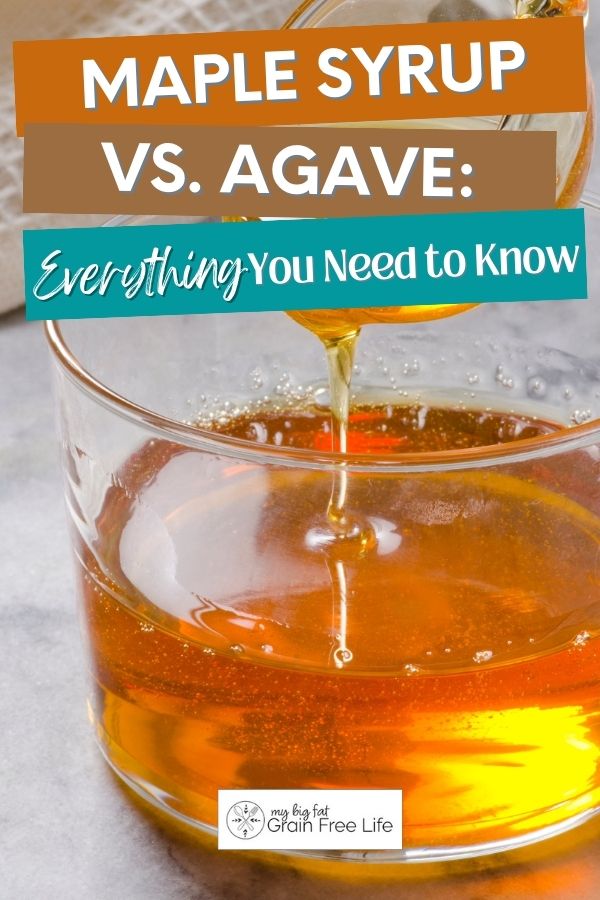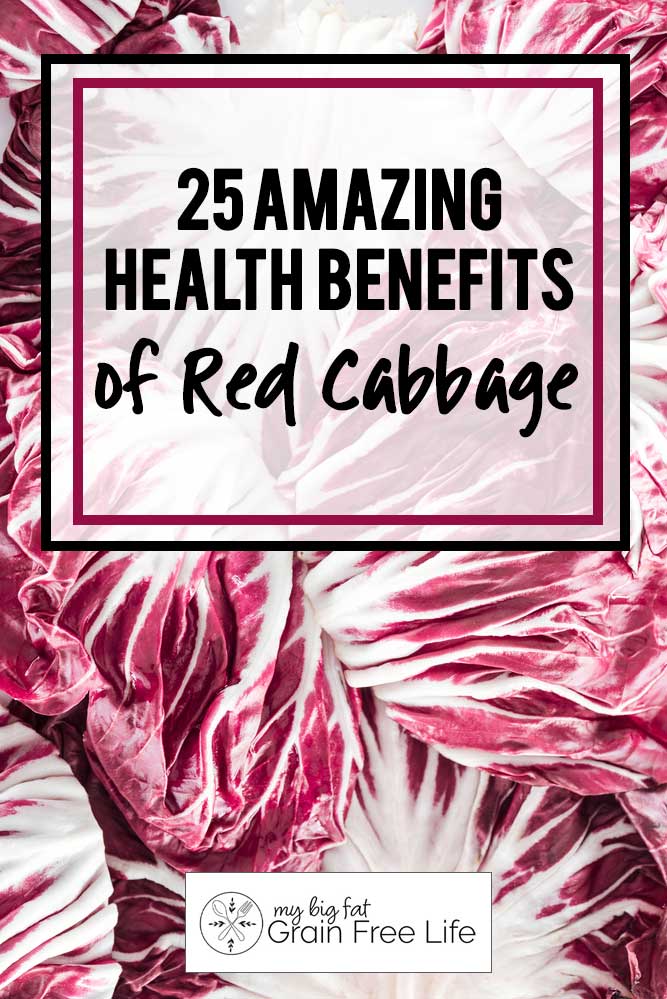Comparing Avocado Oil Vs Coconut Oil (Benefits & Nutrition)
This post may contain affiliate links. If you make purchase after clicking a link, I may receive a commission at no extra cost to you.
Last Updated on September 16, 2023
There are many different cooking oils, some are unhealthy and others contain good fats, like avocado and coconut oils. Let’s explore avocado oil vs coconut oil and compare the taste, nutrition, and uses for cooking.
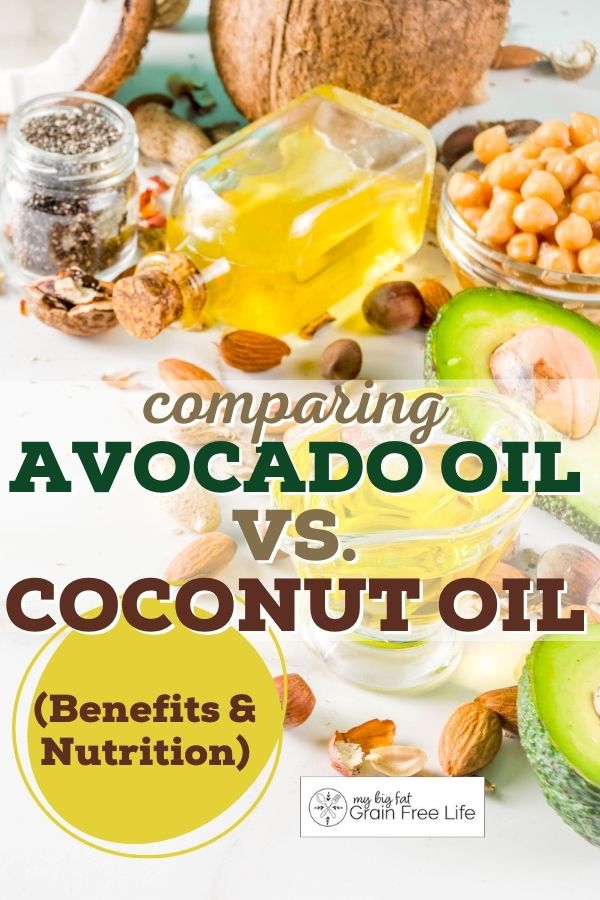
Avocado Oil Vs Coconut Oil
Are you looking for an oil to use while cooking and are weighing the pros and cons of avocado oil vs coconut oil? Both types of vegetable oils can be used as cooking oils, but each have some key differences.
Why Does the Type of Oil You Cook with Matter?
When you are cooking, you need to use a cooking oil that has a high smoke point and will maintain its stability when heated to high temperatures.
Some plant-based oils, like seed oils, have a low smoke point. When they are heated above the smoke point, the oil turns unstable and begins to break down and oxidize. The oil releases free radicals that can damage your body along with the substance acrolein. Acrolein in the air can be dangerous to your lungs.
Avocado Oil
Avocado is a great choice for high-temperature cooking. The smoking point is 520 degrees, which means you can use avocado oil for deep frying.
How Avocodo Oil is Made
All types of avocados are used when making avocado oil. It’s made by washing the produce before removing the pit and skin. Then the avocados are pushed through a press. The pulp from the avocados is then placed in a centrifuge that separates the oil from the pulp. The unrefined oil from the first pressing is labeled as virgin or extra virgin.
Refined avocado oil is filtered to remove the impurities. This also removes most of the flavor and color from the oil. The result is an oil with a higher smoke point than virgin avocado oil.
Flavor Profile
Avocado oil has a neutral and mild flavor that makes it a high quality oil to use for sweet and savory cooking.
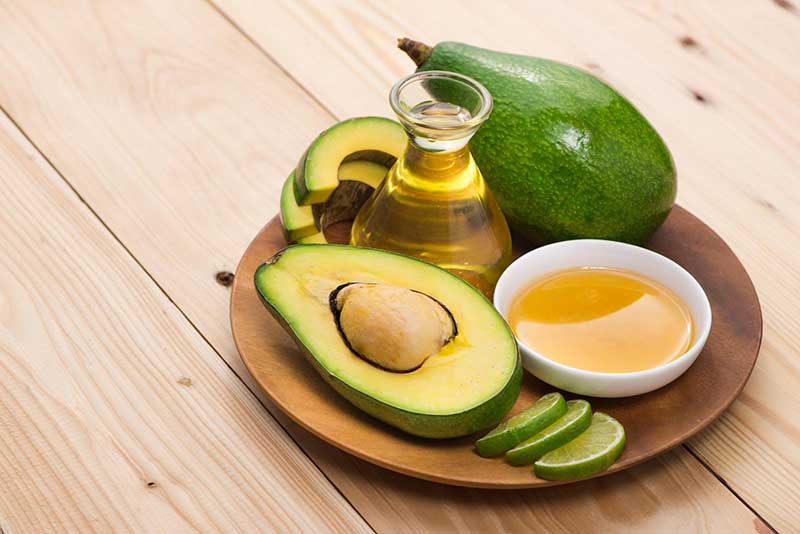
Types of Avocado Oil
There are several different types of avocado oil available.
- Extra Virgin Avocado Oil is unrefined and extracted from high-quality fruit. The oil retains many of the nutrients, has a dark green color, and an avocado flavor. It also has a lower smoke point than other types of avocado oils.
- Virgin Avocado Oil is another unrefined avocado oil that is extracted from sound fruit. The avo oil has many nutrients, a green color, and an avocado flavor.
- Cold-pressed Avocado Oil is made by extracting and refining the oil from avocados without using heat. The process takes longer but preserves the flavor and nutrients.
- Refined Avocado Oil is refined using heat and chemicals to remove the impurities from the oil. The result is a mild oil with a higher smoke point.
Solid or Liquid?
Avocado oil is an unsaturated fat and is liquid at room temperature.
Smoke Point
The smoke point of avocado oil is 520 degrees.
Cooking with Avocado Oil
Avocado oil has a large quantity of good fat, (monounsaturated fat), which means that using avocado oil may reduce your risk of heart disease. As extra-virgin avocado oil can withstand higher temperatures than extra virgin olive oil, it’s a good option for high-heat cooking and making deep-fried food.
Avocado Oil Nutritional Facts
Avocado oil is full of monosaturated fats and polyunsaturated fats. These fats help to reduce cholesterol levels. Avocado oil also has a high vitamin E content.
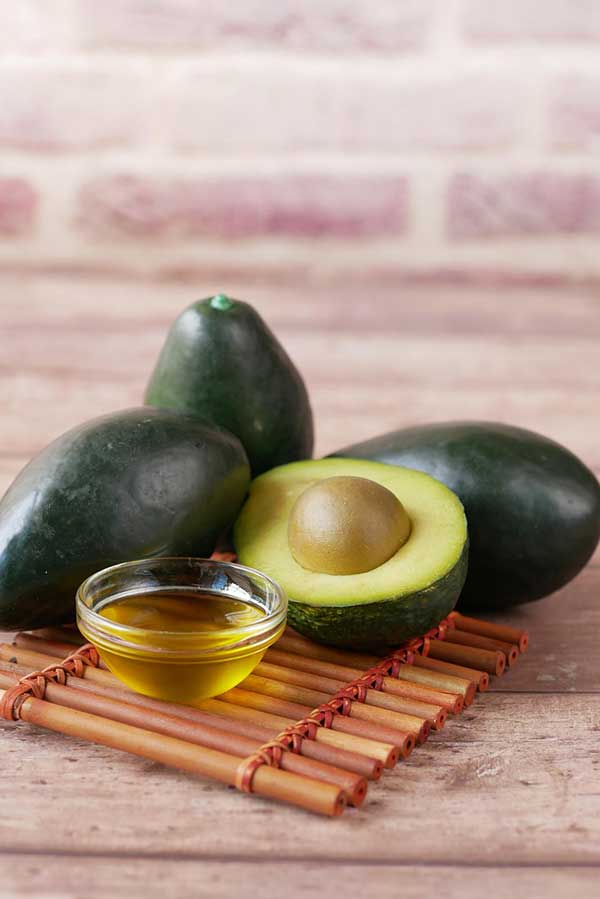
Health Benefits of Avocado Oil
Here are some of the health benefits that you may experience by including avocado oil in your diet.
- Heart Health – Avocado oil has a high percentage of oleic acid and other fats needed for a healthy heart. Ingesting these fats may help to reduce your risk of cardiovascular disease.
- Anti-Inflammatory Effects – Various studies have indicated that including avocado oil may have an anti-inflammatory effect and may reduce CRP.
- Nutrient Absorption – Avocado oil is an excellent source of healthy fats that will help your body absorb fat-soluble vitamins.
- Eye Health – The carotenoid lutein is a nutrient in avocado oil. The nutrient helps to reduce the number of free radicals in the eye.
- Diabetes Management – A diet that includes plenty of polyunsaturated and monounsaturated fat may have a beneficial effect on people who suffer from insulin insensitivity. Avocado oil is full of these fats.
- Helps Maintain Healthy Weight – The fat content of avocado oil helps people feel full faster which helps you maintain a healthy weight.
- Promotes Brain Health – Avocado oil includes polyphenols that help reduce the effect of stress on the brain.
- Great for Skin – Avocado oil is an excellent choice for skin ailments. The antioxidants and vitamins help reduce skin damage, and the oil helps to moisturize dry skin.
Special Diet Compliance
Avocado oil is in compliance with the following special diets: autoimmune protocol, keto, gluten-free, paleo, GAPS, SCD, and vegan.
Primary Fat in Avocado Oil
The primary fat in avocado oil is monounsaturated fats.
Pros and Cons of Avocado Oil
If you are allergic to avocados, obviously you will need to avoid using avocado oil. Avocado oil is a birch pollen allergy food, so if you have allergies to birch pollen, use caution when consuming it.
Coconut Oil
Coconut oil is another one of the culinary oils that is easy to find at the grocery store and has a high enough smoke point to be suitable for cooking.
How It’s Made
This popular oil is made from the white fleshy part of coconuts. During the dry process, the white meat of the coconut is removed from the husk, dried, and then processed to produce the coconut oil. The wet process is less commonly used and involves boiling coconut milk to remove the oil.
Flavor Profile
Coconut oil’s flavor profile changes between unrefined and refined oil.
- Unrefined: coconut flavor
- Refined: neutral flavor

Types of Coconut Oil
Coconut oil comes in a variety of different types. Some types are healthier options to use for cooking than other types.
- Refined Coconut Oil has a higher smoke point and a milder flavor than unrefined types of coconut oil.
- Virgin Coconut Oil has a stronger coconut flavor than refined coconut oil and comes from the first pressing.
- Cold-pressed Coconut Oil has not been heated above 140 degrees which allows the oil to retain more of the nutritional content of the coconut.
- Fractionated Coconut Oil has been fractured or divided into different fatty acids while other types of coconut oil use the whole oil. This allows the fatty acids to be used for specific purposes such as medical applications or special diets.
Smoke Point
Unrefined coconut oil and refined coconut oil have two different smoke points.
- Unrefined: 350 degrees
- Refined: 400 degrees
Cooking with Coconut Oil
Coconut oil has a high saturated fat content, which might be an issue if you’re looking for the healthiest oils. However, the nutty flavor, natural sweetness, and similarity to butter make it an excellent option for cooking.
Some choose to increase the health benefits of smoothies by adding a spoonful of coconut oil forthe addition of a good-quality fat. Others add it to their coffee drinks in place of butter when making bulletproof coffee.
Used in moderation, coconut oil can be part of a healthy diet.
Coconut Oil Nutritional Facts
Coconut oil mostly has medium chain triglycerides, which are more easily digested than many other types of fats. These medium chain triglycerides may help to improve the ratio of good cholesterol to bad LDL cholesterol in the human body.

Health Benefits of Coconut Oil
While coconut oil is high in saturated fat, including it in your daily diet may provide you with these health benefits.
- Heart Health – Medium-chain triglycerides may improve the ratio of good to bad cholesterol in the human body and reduce the risk of cardiovascular disease.
- Weight Management – Some animal studies have indicated that coconut oil may raise the body’s metabolism and help with weight management.
- Digestive Health – Coconut oil may help to increase the number of healthy bacteria in your digestive system and improve your body’s ability to digest nutrients.
- Skin and Hair Care – Coconut oil is used in some beauty products and helps to improve dry skin. It may also improve the strength of health of hair follicles.
- Antioxidant and Anti-Inflammatory Properties – Coconut oil is also full of antioxidants that help to provide anti-inflammatory properties. These help to prevent chronic and degenerative diseases.
- Oral Health – Coconut oil can be swished in the mouth like mouthwash. Doing so helps to reduce the number of harmful bacteria in your mouth and helps to prevent cavities.
- Brain Health – The antioxidants in coconut oil may also help to prevent brain damage from free radicals.
- May Help Prevent Alzheimer’s Disease – The ketones in coconut oil may help with Alzheimer’s Disease by providing brain cells with a different source of energy.
Special Diet Compliance
Coconut oil is in compliance with these special diets: keto, gluten-free, paleo, vegan, low-FODMAP, GAPS, and SCD.
Primary Fat in Coconut Oil
The primary fat in coconut oil is saturated fats.
Pros and Cons of Coconut Oil
Coconut oil is filled with antioxidants and antimicrobials that help to improve the number of healthy bacteria in your cut and reduce the amount of harmful bacteria in your mouth. In addition, it can help to prevent or delay the onset of chronic and degenerative diseases.
However, coconut oil is primarily made of saturated fats that may increase your cholesterol level and risk of cardiovascular disease.
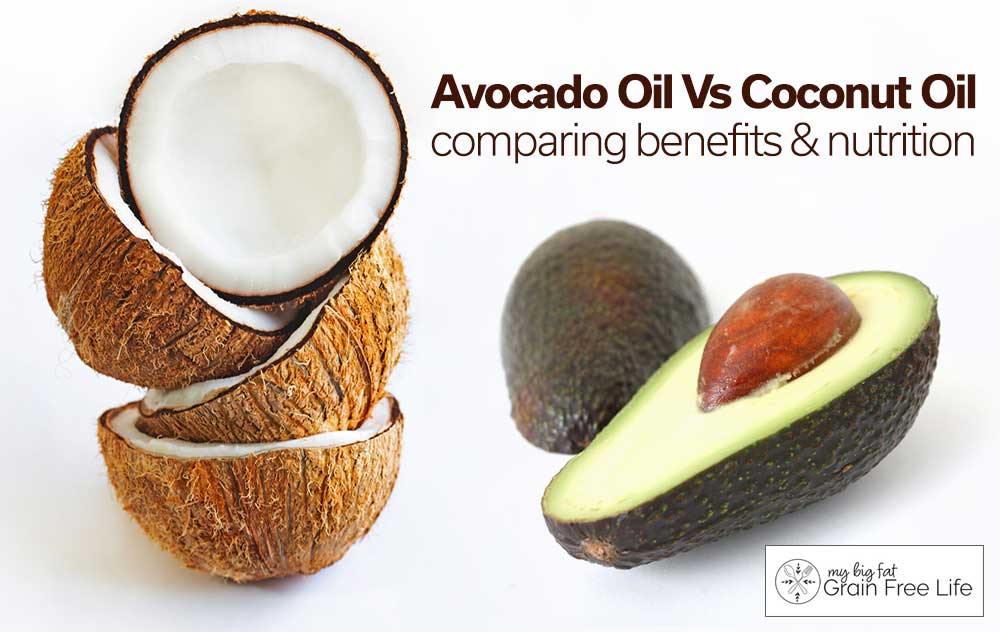
Avocado Oil Vs Coconut Oil
When comparing avocado vs coconut oil, it’s a good idea to compare how the oils are made, their flavors, as well as the health benefits you can expect to get by including them in your diet.
Avocado Oil Vs Coconut Oil Comparison
If you’re looking for the best oil to keep in your kitchen for cooking and baking, both avocado oil and coconut oil are excellent options.
Comparing How It’s Made
- Avocado oil is made by removing the seed and skin from the avocado before pressing. The pulp is then spun on a centrifuge to remove the oil.
- Coconut oil is processed by removing the white meat from the husk, drying it, and then processing it to remove the oil.
Flavor Profile Comparison
Both plant oils have a mild flavor profile. Avocado oil has a delicate grassy flavor, while coconut oil has a nutty, sweeter flavor.
Cooking with Avocado Vs Coconut Oils
Avocado oil has a higher smoke point making it a good oil to use when deep frying or cooking with high heat. Coconut oil has a texture closer to butter and a sweet flavor. It’s an excellent choice for baking or tropical dishes.
Nutritional Composition of Avocado Oil Vs Coconut Oil
Avocado oil is packed with monosaturated fats, polyunsaturated fatty acids, antioxidants, and vitamin E making it a healthy oil to cook with. Coconut oil is primarily saturated fats. However, it’s made of medium chain fatty acids like lauric acid. These fatty acids will help to protect your body from various illnesses and chronic diseases.
Health Benefits Comparison
Both coconut oil and avocado oil will help with weight management and nutrient absorption as the fat helps you feel full faster and helps you absorb nutrients. The oils may also improve the health of your skin. Both culinary oils also have antioxidant and anti-inflammatory properties.
Avocado oil also reduces your risk of cardiovascular disease, may help with managing diabetes, and improves the health of your eyes.
Coconut oil may improve your oral health while helping to prevent Alzheimer’s disease.
Avocado Oil Vs Coconut Oil For Weight Loss
Avocado oil may help with weight loss by helping you feel satiated faster which causes you to eat less.
Coconut oil also helps you feel satiated. In addition, animal studies have indicated that it may increase metabolism.
Importance of Healthy Fats and Oils in Your Diet
Fats and oils are an essential part of your diet to remain healthy. Not only do they help you feel full faster, but they also help you absorb fat-soluble vitamins while providing other essential nutrients.
Monounsaturated Fat Vs Saturated Fat
Monounsaturated fats are liquid at room temperature whereas saturated fats are solid.
Most saturated fats come from animal sources. They may increase the amount of bad cholesterol you have in your body.
Monounsaturated fats tend to come from plant sources and provide the body with nutrients, antioxidants, and essential fatty acids.
Other Healthy Oils
Avocado oil and coconut oil are not the only healthy oils. Here’s a list of other oils you can consider using.
- Olive Oil
- Tallow
- Lard
- Walnut Oil
- Macadamia Nut Oil
- Flax seed oil
- Ghee
The worst cooking oils for you are as follows:
- Vegetable Oil: High in omega-6 fatty acids, which can promote inflammation in the body when consumed in excess.
- Canola Oil: Contains high levels of omega-6 fatty acids and goes through a heavily processed refining process, leading to potential negative health effects.
- Soybean Oil: Similar to vegetable oil, it is high in omega-6 fatty acids and may contribute to inflammation if consumed in large amounts.
- Corn Oil: Also high in omega-6 fatty acids and undergoes extensive processing, making it less beneficial for your health.
- Cottonseed Oil: Contains high levels of omega-6 fatty acids and may also contain traces of chemical solvents used during its extraction process.
Learn more: What are Seed Oils? Are They Really Bad for Your Health?
For overall health, it’s recommended to opt for healthier alternatives such as extra-virgin olive oil, avocado oil, or coconut oil, which provide beneficial nutrients and fats. Always consult with a healthcare professional or nutritionist for personalized dietary advice.
How to Store Avocado Oil and Coconut Oil
Both oils should be stored in a dark area away from heat. Avocado oil should be used within six months of opening while coconut oil can last for two years.
Frequently Asked Questions
Do you still have questions about using coconut oil versus avocado oil in your cooking? Here are the answers to some of the most commonly asked questions.
Can I Substitute One For The Other?
You can usually substitute avocado oil for coconut oil or vice versa. Avocado oil has a higher smoke point that allows it to be used at higher heats while coconut oil has a sweeter taste.
Which Is Better For Cooking?
If you are baking, the sweet flavor of coconut oil often enhances the taste of the dish. However, avocado oil has a higher smoke point that allows it to be used at high temperatures.
Which Has A Lighter Flavor?
Coconut oil has a sweet coconut flavor while avocado oil has a mild avocado flavor that doesn’t overpower a dish.
When Do I Use Coconut Oil Vs Avocado Oil?
Coconut oil has a buttery texture and a sweeter taste making it an excellent choice for baking and tropical dishes. Avocado oil has a higher smoke point which allows it to be used to make deep-fried foods.
Final Summary
Choosing between avocado oil vs coconut oil depends on your specific needs and preferences. Avocado oil’s high smoke point and mild flavor make it a great all-purpose cooking oil, while coconut oil’s unique properties and tropical taste lend themselves well to certain recipes. For skincare, consider your skin type and desired benefits before making a selection. Ultimately, both oils offer health and beauty benefits, so incorporating them into your routine can be a delicious and nourishing choice.
Sources
- https://www.healthline.com/nutrition/best-cooking-oils
- https://californiaavocado.com/avocado101/how-avocado-oil-is-made/
- https://chosenfoods.com/blogs/central/how-pure-avocado-oil-is-made-a-step-by-step-overview
- https://juliasorganic.com/extra-virgin-vs-refined-avocado-oil-know-the-difference/
- https://www.thespruceeats.com/what-is-avocado-oil-5201003
- https://latourangelle.com/blogs/general/6-benefits-of-virgin-avocado-oil
- https://www.aocs.org/stay-informed/inform-magazine/featured-articles/what-is-unrefined-extra-virgin-cold-pressed-avocado-oil-april-2010?SSO=True
- https://pristineorganics.com/switch-to-cold-pressed-oils/
- https://www.allrecipes.com/article/cooking-with-avocado-oil/
- https://www.simplyrecipes.com/your-guide-to-avocado-oil-5196580
- https://www.arthritis.org/health-wellness/healthy-living/nutrition/healthy-eating/best-oils-for-arthritis
- https://www.ndtv.com/food/type-2-diabetes-how-consuming-avocado-oil-can-help-diabetics-1986223
- https://www.medicalnewstoday.com/articles/321543
- https://www.bonappetit.com/test-kitchen/ingredients/article/cooking-with-coconut-oil
- https://en.wikipedia.org/wiki/Coconut_oil
- https://www.sciencedirect.com/topics/neuroscience/coconut-oil
- https://www.healthline.com/nutrition/top-10-evidence-based-health-benefits-of-coconut-oil
- https://www.healthcanal.com/nutrition/coconut-oil-gut-health
- https://www.verywellhealth.com/difference-between-saturated-fats-and-unsaturated-fats-697517



